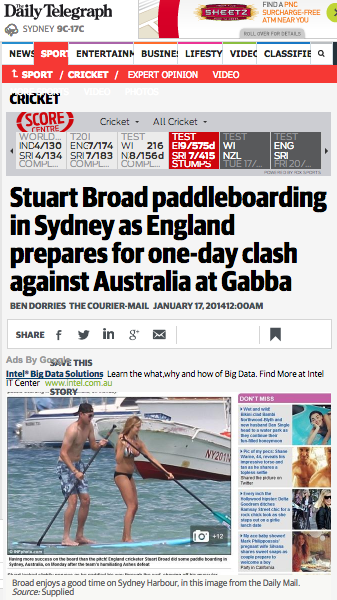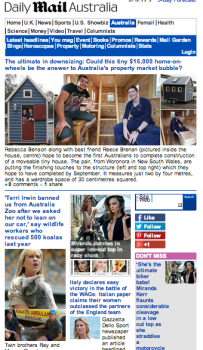Daily Mail fires back at News Corp as copy theft row heats up
 The Daily Mail has returned fire at News Corp over accusations the UK newspaper’s new Australian operation is breaching copyright and fair use laws in how it has been taking quotes and copy from its newspapers and republishing them on their website, arguing that the publisher is guilty of breaching those laws themselves.
The Daily Mail has returned fire at News Corp over accusations the UK newspaper’s new Australian operation is breaching copyright and fair use laws in how it has been taking quotes and copy from its newspapers and republishing them on their website, arguing that the publisher is guilty of breaching those laws themselves.
Last Monday News Corp sent a legal letter to the Daily Mail’s global editor-in-chief Martin Clarke accusing the publication of lifting “reams of copy” from News’ titles, and ordering the practice to stop, or face a court battle. The publisher also ran a full-page of articles in last Monday’s Media section in The Australian on the issue.
However, a fiery return statement from the Daily Mail Australia cites instances of its own copy and images had been taken without permission, while arguing that it was operating in line with “best web aggregation practice” and accusing News Corp of not understanding the fundamentals of online journalism and describing its local executives as “King Canutes”.
“News Corp’s accusations are preposterous,” said a Daily Mail Australian spokesman, “This is a cynical attempt to damage the reputation of Mail Online and its hard-working journalists.”
Legal experts told Mumbrella if the case goes to court it could set new standards for online journalism in Australia and what is acceptable under the fair dealing provision of the Copyright Act.
In last week’s legal letter News Corp set out ten instances of the Mail, which launched last November in Australia, of copying significant amounts of original content from News’s journalists, in what is potentially a breach of fair dealing provision under Australian law.
Today’s statement from the Daily Mail Australia responds directly to the allegations, with its own legal letter demanding News Corp’s online properties stop posting stories from its website without proper attribution or citing only an “British newspaper” and that it should end its policy of refusing to hyperlink to rivals.
 “When carrying Mail Online or Daily Mail material we have discovered that News Corp often neglect to name their source and even when they do, they most often don’t provide a link back to the original story,” said a spokesman for the Daily Mail Australia, citing examples such as photos were taken from their website, with the Mail’s ‘sidebar of shame’ clearly visible and labelled under “supplied”or where photographs were listed as “Daily Mail”.
“When carrying Mail Online or Daily Mail material we have discovered that News Corp often neglect to name their source and even when they do, they most often don’t provide a link back to the original story,” said a spokesman for the Daily Mail Australia, citing examples such as photos were taken from their website, with the Mail’s ‘sidebar of shame’ clearly visible and labelled under “supplied”or where photographs were listed as “Daily Mail”.
While News Corp pays for the right to use some copy from the UK newspaper it is understood these rights only apply to copy published in the print edition of the UK newspaper.
“Rupert Murdoch is a brilliant, buccaneering innovator who built a global media empire by challenging old business models and vested interests. How sad that the King Canutes now running his Australian print operation are so unfamiliar with how the modern digital world works.”
News Corp declined to be drawn on the reasons for its policy of not hyperlinking to others. A spokesman for the publisher said: “We stand by the fact that we believe the Daily Mail Australia is breaching our copyright by lifting substantial slabs of original content from a large number of articles from our mastheads.”
The Daily Mail said it rejected the claims that it was in breach of copyright law. “At the Daily Mail Australia we aim to break news stories each day and have already begun to do so,” said the spokesman.
“However, like all news media – in particular the giant American digital news-aggregation sites – we also follow up on the stories of the day that have been covered elsewhere.
“At Mail Online we pride ourselves that when we tackle a story in the public domain we always try to add some new piece of information, pictures or video. And if we rely on material from another news organisation’s stories we ensure that the source is clearly attributed and include a hyperlink that directs our readers back to the original story – in common with best web aggregation practice. Sadly this courtesy does not hold true at News Corp.”
News Corp has been watching the Daily Mail Australia’s launch closely since it was announced its arrival last November. It was since faced the loss of a number of staff the British title, which has poached former news.com.au editor Luke McIlveen to run its local operation.
News has also appeared to take preemptive action to counter the new rival even launching a redesigned Daily Telegraph that appeared to mirror the Mail Online model, including its very own ‘sidebar of shame’ in the right hand rail.

 Griffith University’s Professor Mark Pearson who is the author of A Journalist’s Guide to Media Law said were the case to go court it may set a new standard for what copy can and can not be used.
Griffith University’s Professor Mark Pearson who is the author of A Journalist’s Guide to Media Law said were the case to go court it may set a new standard for what copy can and can not be used.
“Any intellectual property case like this could set a new standard because much depends on whether the dealing in the material has been ‘fair’ and that comes down to whether there has been adequate attribution and whether a reasonable proportion of the whole article has been used,” said Pearson. “We don’t have enough precedents for this to give a firm answer, so all cases help us narrow this down.”
Copyright expert Michael Fraser said the dispute was an important one to the future of journalism. “It is a big issue. How are we going to maintain quality journalism in a new environment when others exploit the investment of newspapers without contributing to the cost of gathering the news,” said Fraser, director of the Communications Law Centre at UTS.
“I think the laws are clear in our context because there is exclusions in fair dealing and people in both Australian and UK jurisdictions.
“In this case copying for the purposes of reporting the news in both Australia and the UK are explicitly included as fair dealing provided the criteria for reporting is met. They are very clear exemptions, but in order to meet that standard the dealing has to be fair and also acknowledge the author.”
Professor of journalism at the University of Melbourne, Margaret Simons said neither side should be trying to claim a high moral ground and that the issue was widespread.
“Nobody has clean hands in this kind of thing,” said Simons, who runs the Centre for Advancing Journalism. “Take Fairfax, which refuses to credit The Guardian, instead describing it as ‘website’ when forced to refer to one of its stories.
“News organisations would be better advised to acknowledge freely.”
Nic Christensen




The Tele’s redesigned website including it’s right rail is the most blatant rip off of the Daily Mail. Everyone knows the right rail is a signature part of the Mail. They should sue News Corp for that alone, despite the lack of traffic the Tele’s website gets.
User ID not verified.
The Daily Telegraph and Sydney Morning Herald having been doing it for years now. Copying large chunks of articles from other papers without attribution.
User ID not verified.
I like the term “best web aggregation practice”, like I do ‘honour among thieves’.
User ID not verified.
Mail Online can’t get their analogies right (re: King Canute).
According to the story, the king had his chair carried down to the shore and ordered the waves not to break upon his land.
When his orders were ignored, he pronounced: “Let all the world know that the power of kings is empty and worthless and there is no King worthy of the name save Him by whose will heaven and earth and sea obey eternal laws,” (Historia Anglorum, ed D E Greenway).
The account shows Canute setting out to demonstrate that the tide would come in regardless, says Professor Simon Keynes of the department of Anglo-Saxon, Norse and Celtic at the University of Cambridge.
(via BBC http://www.bbc.co.uk/news/magazine-13524677)
User ID not verified.
Surely when News and the Daily Heil start lecturing each other on ‘ethics’ is a sign of the impending apocalypse?
User ID not verified.
Actually, this might just be the ‘War of the glass houses’
User ID not verified.
Good article. It is an interesting and massive issue… and I would love for both parties to take it to court so we can get some clarity. I agree with Simons… no one has their hands clean on this and the lack of guidelines has fostered a bit of an ‘anything goes’ attitude.
User ID not verified.
Three Words: Pot. Kettle. Black
User ID not verified.